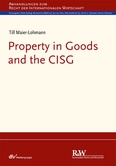1 § 1: Introduction
1
Drafters of unified contract laws often deliberately exclude questions of property, ownership, or title from the scope of application. Article 8 of the Uniform Law on International Sales (ULIS) and Article 4, sentence 2(b) of the United Nations Convention on Contracts for the International Sale of Goods (CISG) exemplify this exclusion. This should not, however, be mistaken to mean that a smooth delimitation of property law and unified sales law has thereby been established. The law governing the property in goods has seen no notable acts of international harmonization.1 There are thus myriad notions of rights, liabilities, terms, and concepts from various legal systems that need to be considered when analyzing the interplay between unified sales contract law like the CISG with property in goods.
2
Rabel discovered a remaining relevance of property in the realm of uniform sales law in his ground-breaking work “Das Recht des Warenkaufs” nearly a century ago. He found the concept of property to be partly overestimated and partly underestimated regarding unified sales law, and set out to analyze the practically important facets at the end of the work.2 Accordingly, the table of contents of Volume 1 contains an announcement for a “VIII. Teil. Sicherungen des Verkäufers”3 in Volume 2.4 Volume 2 does not deliver on this promise. In the preface to volume 2, Dölle explained this to be due to the rudimentary state in which the manuscript of this part was when Rabel died before the publication of the second volume.5 Honnold also was aware
3
Nevertheless, the interplay and tensions between property in goods and the CISG have not yet been comprehensively analyzed. This study endeavors to fill that void.
| 1 | But see for the developments under European law between 1989 and 2016, Walczak, pp. 15–41. |
| 2 | Rabel, Recht des Warenkaufs I, pp. 31–32. |
| 3 | My translation: Part 8: Securities of the seller. |
| 4 | Rabel, Recht des Warenkaufs I, p. XXIV. |
| 5 | Rabel, Recht des Warenkaufs II, pp. III–IV. Despite considerable efforts, I was not able to find this unpublished and maybe lost manuscript. It is neither in the Max Planck Institute for Comparative and International Private Law in Hamburg, nor (as part of the so-called Rabel Koffer) in the archives of the Max Planck Society in Berlin. In 1969 Landfermann entered the Max Planck Institute for Comparative and International Private Law in Hamburg and Zweigert tasked him with researching this area of the law in a comparative manner. During the time of his research, the manuscript was still in Hamburg and was at his disposal. Yet, it was already then partially outdated, and judging from the book that resulted from the research (Landfermann, Sicherungen des vorleistenden Verkäufers), the manuscript was concerned with the protection of the seller after the goods have been dispatched and received by the buyer. The (limited) scope of the manuscript can be explained against the background of other assumptions and ideas Rabel had when drafting “Das Recht des Warenkaufs”. As will be discussed in more detail below (para. 75), Rabel considered it preferable to avoid national law concepts such as property in uniform sales law. As a result, the first draft of a uniform sales law in 1935 only contained a single reference to property, which excluded any effect of the unified sales law on the property in the goods. It, thus, did not contain an obligation of the seller to transfer the property in the goods. Since there was no such obligation, the characterization of a sales contract was not necessarily connected to “property”, and the scope of application therefore not connected to this notion. Moreover, the claim for the purchase price was regulated in a very different manner compared to today’s Art. 62 CISG in combination with Art. 28 CISG. Hence, although the loss is unfortunate, Rabel’s manuscript would probably not have provided much insight into the current interplay between the CISG and national property law. |
| 6 | Honnold, 30 Law and Contemporary Problems (Spring 1965), 326, 350. |


